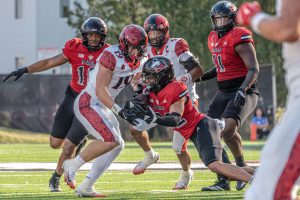Advising center prescribed to help students find a major
August 3, 2004
In fall 2005, NIU will open an academic advising center to help students choose a major.
The center will be able to help new students who are undecided about their majors and careers early on, said Gary Gresholdt, vice provost for Student Affairs.
Advisers will assist undecided majors in choosing classes that suit their interests and needs.
A close working relationship will be established between the Career Counseling Center and the advising center, he said.
Once the centers have worked together to assist students in choosing a major, they will be transferred to an adviser within their major’s college.
“It’s an excellent idea,” said Kathy Hotelling, director of the Counseling and Student Development Center.
In 2002, 1,702 students were undecided majors. By the end of 2003, that number had risen to 1,917.
“It’s a more holistic approach to advising,” said Michelle Emmett, associate vice provost for Student Affairs.
The NIU Retention Task Force devised the concept for the center.
The task force consists of individuals from multiple departments throughout the campus who focus on all four years of the undergraduate academic experience and how to keep students at NIU.
The group has four basic categories in which they work: retention data and information, academic variables, campus and student life and practice and patterns of other institutions.
“NIU has improved its reputation in the past couple of years,” Emmett said. “Everything really affects retention.”
As a recommendation by the task force, the center’s larger goal will be to improve the retention rate of students, Vice Provost Earl Seaver said.
The task force believes retention has as much to do with the students’ personal issues as with their classroom performance, Peters said in 2003.
In today’s culture, there is pressure coming from all sides to choose a major quickly, Hotelling said. One’s major is an identifying factor in college life.
“This sends a message to students that it’s OK not to have a major when they arrive,” Hotelling said.
The task force has discussed proposals periodically for the center since it began meeting last fall. Now is a good time to pursue the idea, Gresholdt said.
The center will be staffed by two professional advisers and the center coordinator. None of the positions have been filled yet.






